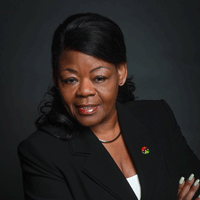Webinar offers tips to churches on connecting with veterans and addressing issues related to poverty and homelessness
July 22, 2023

Photo by Jack Sharp via Unsplash
A woman with lived experience as a homeless veteran brought home the importance of ongoing support for veterans during a recent webinar that explored issues related to poverty among veterans and how churches can help.
Wendy McClinton, president and chief executive officer of Black Veterans for Social Justice in New York, said there’s a flurry of attention given to veterans by civic leaders and other individuals during special holidays but not enough at other times.
“It’s sad because after Veterans Day and after Memorial Day, then I think, ‘What happened to all that enthusiasm?’” she said. “We have to be veteran-friendly every day, not just one day, not just two days.”
McClinton, who was homeless for a time after serving in the military, was one of the featured guests during a recent virtual discussion in the Presbyterian Committee on the Self-Development of People’s “The Struggle is Real” webinar series, which encourages engagement and activism by churches to eradicate poverty. The series places an emphasis on listening, engaging and forming relationships with communities.

Wendy McClinton
One common theme during the webinar was the importance of delving into preexisting services, programs and resources when looking to assist veterans who may be struggling with homelessness, mental illness, unemployment or other problems.
“I have always encouraged my congregations to try not to reinvent the wheel,” said the Rev. Dr. Bill Nisbet, a retired Army chaplain who worships with Roswell Presbyterian Church in Georgia and is affiliated with Presbyterian Federal Chaplaincies, a partnership organization of the Presbytery of Greater Atlanta. It’s important to “look around for resources.”
Nisbet, a retired Presbyterian Church (U.S.A.) pastor, recommended Veteran/Military Friendly Congregations (VMFC), a program started by faith-based communities to promote a sense of community, acceptance and support for veterans and their families.
“It encourages congregations to identify themselves as people who welcome” military members, veterans and their families, he said, and to offer support in various ways, such as assembling care packages.

The Rev. Dr. Bill Nisbet
Tom Portman, a military ministry leader with Vienna Presbyterian Church in Virginia, also discussed VMFC. Any congregation, regardless of denomination, “can start up their own program under the VMFC,” and “it’s a great way to find out what other congregations are doing and learn from their best practices as well.”
The Rev. Dr. Hope Lee, Vienna’s lead pastor, promoted Stephen ministers as a way to help veterans and recommended that congregants approach their pastors when interested in seeing their churches start military ministries.
“It really comes from, I think, lay people saying to the pastor, ‘What do you think about this?’ and then pastors having the ability to say, ‘Yes, absolutely do it,’” Lee said. “Go have a conversation with your pastor, and if they’re worried about it, have them call me.”
Nisbet said veterans sometimes have difficulty when making the transition back to civilian life without adequate help, but churches can help by having a system in place to track them and ask whether they need help as well as keeping a prayer list.

The Rev. Dr. Hope Lee
“The ones that don’t have the support tend to end up on the street or having mental problems,” he said. “PTSD can completely overwhelm someone. Some people manage it, but many people do not.”
Portman said it’s important to figure out who the veterans are in your congregation, obtain contact information and create a distribution list. Another step is to “reach out to some of your local veterans service organizations, the American Legion, the Veterans of Foreign Wars,” and to inquire about unmet needs.
McClinton said it’s essential to get connected with the Department of Veterans Affairs to learn about programs and services that are offered and to learn about different aspects of working with veterans and their families. “A lot of individuals, we have good hearts, and we want to do great work and do great things. But we still have to know how to handle veterans and their families,” she said. After serving in the military, the returning veteran “is not the same person that’s coming back to your home. They’re going to be changed,” and so it’s necessary to learn how to connect with them.
To learn more about “The Struggle is Real series,” go here: vimeo.com/showcase/9083159.
Darla Carter, Communications Strategist, Presbyterian Mission Agency
Daily Readings
Today’s Focus: Presbyterian Committee on the Self-Development of People’s “The Struggle is Real” webinar series
Let us join in prayer for:
PC(USA) Agencies’ Staff
Janet Hayes, Mission Specialist, Christian Formation, Presbyterian Mission Agency
Let us pray
O God, forgive our sins in failing to acknowledge and respect our relationships in which our lives are sustained. Enable us to be more like Jesus Christ and to be servants to the rest of Creation. In so doing, help us to enjoy the fullness of life that you offer in Jesus Christ. Amen.